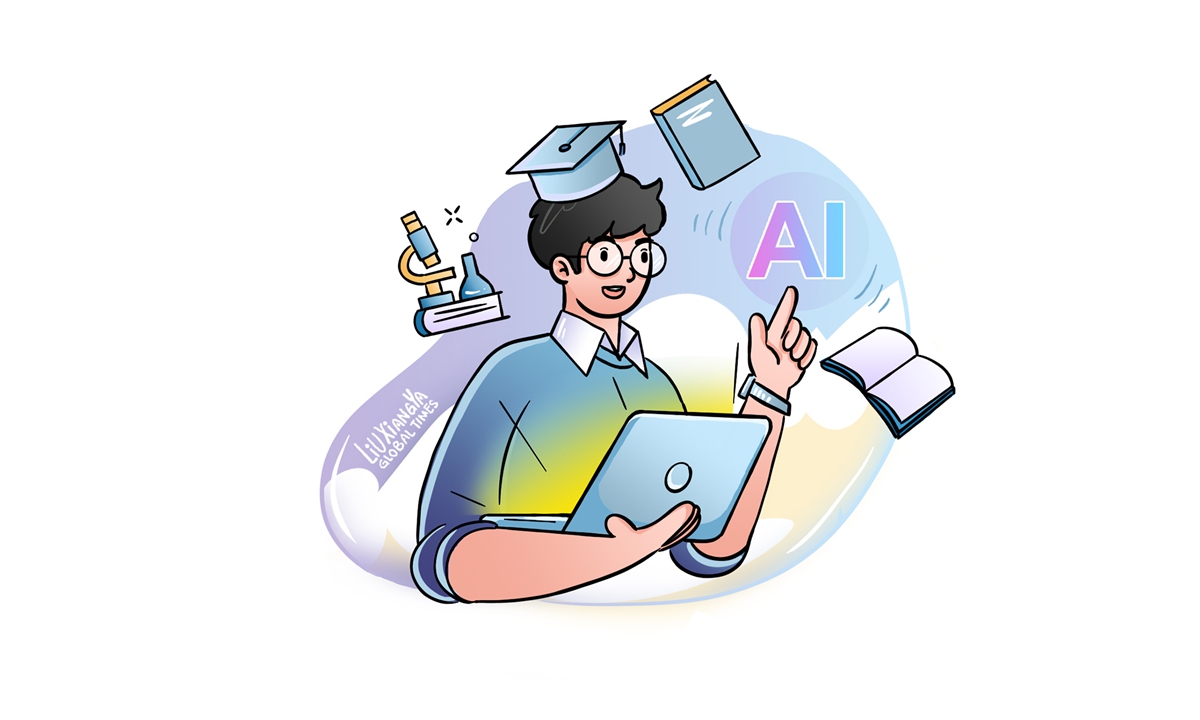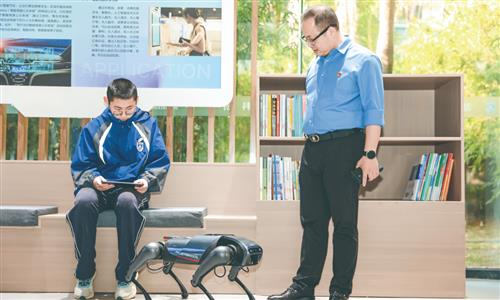
Illustration: Liu Xiangya/Global Times
As the 2024 graduation season approaches, many Chinese universities have issued regulations on how students should use generative AI for academic writing, as well as the proportion of AI ghostwriting allowed.
Many students have admitted that they use AI in their thesis writing to gather literature, process data, and write code. However, some students have also conceded that content generated by AI can sometimes contain errors.
Education insiders have stated that the complexity brought by AI technology to the talent cultivation in higher education is an unavoidable reality. They encourage students to use AI as an aid in their coursework, but emphasize that the results produced by AI should be the product of students' critical thinking and active learning, rather than simple "copy and paste."
In response to this trend, several universities across the country have implemented or announced regulations to monitor the use of AI-generated content in graduation theses, the Beijing Youth Daily reported on Monday.
For example, on April 10, the undergraduate college of Hubei University issued a notice stating that they would conduct risk assessments on articles using generative AI during the thesis review process. If a thesis is flagged as having a "high risk of AI ghostwriting," academic staff are required to guide students in making revisions.
Similarly, on April 28, Fuzhou University announced that they would conduct checks on AI ghostwriting in the graduation theses of the 2024 undergraduate cohort, with the results serving as a reference for grading and selecting outstanding theses.
Furthermore, some universities have stipulated that students should disclose their use of AI in their graduation theses and adhere to ethical and reasonable practices.
The undergraduate college of the Communication University of China issued a notice on regulating the use of AI in 2024 graduation theses (designs), followed by detailed regulations from various departments.
For instance, the School of Continuing Education at the university requires students to clearly disclose whether they have used generative AI, including details such as the model/software/tool name, version, and usage time. Additionally, they must specify the process of generating content related to facts and opinions, and provide proper citations in the thesis to ensure accuracy and respect for intellectual property rights.
Some universities have also outlined guidelines for the appropriate use of AI and procedures for reevaluation if usage exceeds certain limits.
In January, the Jiangxi Institute of Applied Science and Technology issued a notice regulating the use of AI collaboration tools by students, emphasizing that AI tools should only be used for literature retrieval, data processing, and other auxiliary tasks, and not directly for thesis writing. The school encourages the reasonable use of new tools and technologies but stresses the importance of students engaging in independent thinking, knowledge comprehension, and hands-on practice to foster creativity.
Tianjin University of Science and Technology has set a threshold for AI-generated content in undergraduate theses. If the AI detection results exceed 40 percent, students will receive a warning from the college and be required to conduct corrections. The university also aims to enhance academic integrity education and reminds students to strictly adhere to academic norms and ethics to avoid excessive reliance on intelligent content generation.
In light of these developments, some students at the Communication University of China, with the support of faculty staff, drafted an "Initiative for Correct Use of Generative Artificial Intelligence by University Students." The initiative emphasizes the importance of understanding the limitations of generative AI, cultivating critical thinking skills, and media literacy to identify and handle potentially harmful, false, or illegal information generated by AI, according to the Beijing Youth Daily.
For instance, generative AI may fabricate non-existent references in academic writing, compromising the accuracy and originality of the content. One of the initiators of the initiative, Xudi, who is pursuing a PhD in cultural industries, stressed the need for students to exercise caution and critical thinking when utilizing AI tools to avoid potential pitfalls.
A student surnamed Li told the Global Times on Monday that she submitted her graduation thesis in May, incorporating generative AI as her "research assistant." She not only conducted research under the guidance of her teachers but also utilized AI to enhance the logical structure of her thesis.
Another student surnamed Zhang told the Global Times that he used AI to construct sentences and assist in literature retrieval for his thesis.
While both students acknowledged the benefits of AI in their research process, they also expressed reservations about fully relying on AI due to its limitations and potential errors.
Professor Zhang Hongsheng, the executive dean of the School of Cultural Industries Management at the Communication University of China, emphasized the significant impact of AI technology on talent cultivation in higher education. He encouraged students to innovate and experiment with AI tools but stressed the importance of maintaining originality and critical thinking in their work.
Whether to use ChatGPT depends on whether there is cognitive investment in using it. ChatGPT helps writers gather reference materials for their papers, which not only increases the efficiency of the work, but also allows researchers to devote more energy to more creative work, Zhu Wei, a profess or from the China University of Political Science and Law, told the Global Times.
For those students who just use it to cope with homework or exams, this is putting the cart before the horse, which should be restricted, Zhu noted.
Zhang Hongsheng highlighted the importance of strengthening technical supervision in academic work such as thesis writing and design projects. Quoted by the Beijing Youth Daily on Monday, Zhang stressed the role of educators in guiding students to understand the principles and ethical considerations of AI technology, discouraging shortcuts and academic misconduct.

